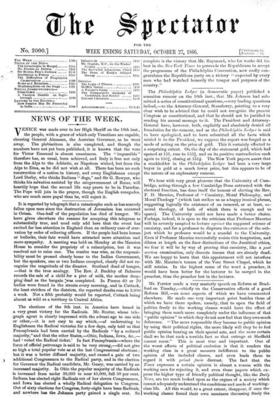It is reported by telegraph that a catastrophe such as
has scarcely fallen upon men since the destruction of Jerusalem has occurred in Orissa. One-half of the population has died of hunger. We have given elsewhere the reasons for accepting this telegram as substantially true, and need only add here that the event has excited far less attention in England than an ordinary case of star- vation by order of relieving officers. If the people had been horses or bullocks, their fate would have attracted more attention and more sympathy. A meeting was held on Monday at the Mansion House to consider the propriety of a subscription, but it was resolved not to raise one. The resolve was wise, as the responsi- bility must be pressed clearly home to the Indian Government, but the speakers, one or two Indians excepted, clearly did not re- cognize the magnitude of the disaster. Scotland dead of hunger, —that is the true analogy. The Rev. J. Buckley of Balasore records the sale of a child for a pint of milk, the mother drop- pingdead as the bargain was completed. In Pooree 60 or 70 bodies were found in the streets every morning, and in Cuttack, the least stricken of the districts, the reported deaths rose to 3,000 a week. Not a fifth probably would be reported, Cuttack being almost as wild as a territory in Central Africa.


































